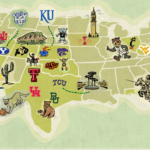The Great Salt Lake is shrinking. Due to increased irrigation and drought, more than 750 square miles of the lakebed are dry. And wind in this exposed area is blowing dust around the region, which can lead to devastating effects—including faster snowmelt and air quality issues, according to a new report from U atmospheric scientist Kevin Perry.
“Most people think that any water that goes into the lake is wasted water because it turns salty and we can’t drink it or use it through irrigation. So, there’s this mindset locally that we should use all the water before it gets to the lake because once it gets to the lake, it’s useless,” says Perry. But each drop adds to the unique interconnected environment supported by the waters of the Great Salt Lake.
Perry has been studying the dry part of the lakebed—also known as the playa—since 2016, mostly on his bicycle. The area has a surprising diversity of plant life and wildlife—he’s encountered porcupines, pelicans, coyotes, bison, and even cougar tracks. As he’s explored the playa, he’s catalogued each area: Was there vegetation? How thick was the surface crust, and how erodible was it? Were there any other features, such as mineral crystals, sand dunes or, cryptically, rocks with long trails in the playa suggesting they had moved over time? He’s also taken samples back to the lab to analyze for percentages of silt and clay.
With Perry’s research, other scientists studying the effects of dust on snowpack in Utah’s mountains can use the chemical signatures in soil samples to determine where the dust comes from. For example, ecologists can assess the effects of both nutrients and toxic elements in the dust on near and distant ecosystems. And dust can now become part of the conversation about conserving and protecting the Great Salt Lake.
“I started off as a scientist, and I’m starting to feel more like an advocate for the preservation of the lake,” Perry says.
Find out more about Perry's research here.



Comments
Comments are moderated, so there may be a slight delay. Those that are off-topic or deemed inappropriate may not be posted. Your email address will not be published. Required fields are marked with an asterisk (*).